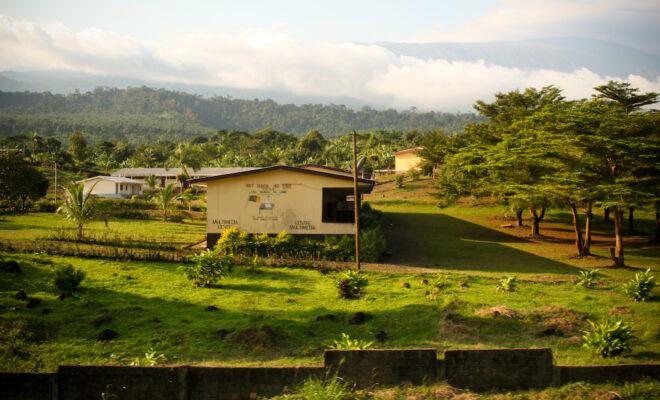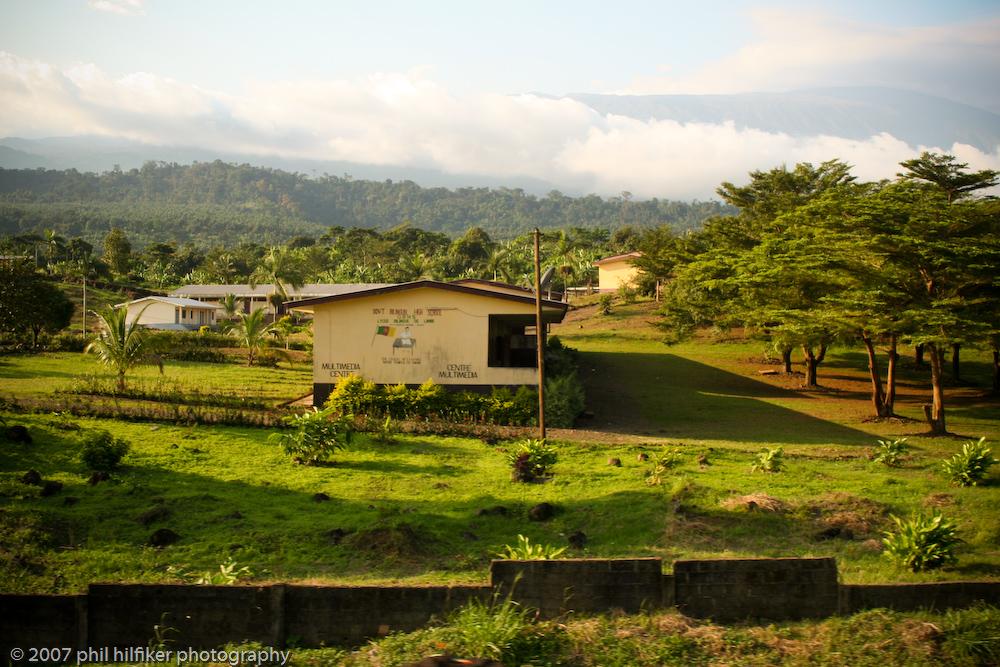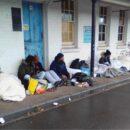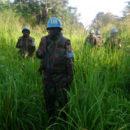“I’ve not gone to school again”: The student victims of Cameroon’s crisis

For years now, students and teachers in the Anglophone regions have been prevented from going to school.

Cameroon schools: A school in Limbe, South West Region of Cameroon where the enforced school boycott continues. Credit: Phil Hilfiker.
It’s 8am on Monday morning in Old Town, a locality in Bamenda, but there are barely any people on the streets. In the centre of this city in Cameroon’s North West region, even fowls and stray dogs are nowhere to be found.
Things were not always this way. The streets around Ayaba Hotel used to be flooded with school children and commuters at this time of day, but things have changed since the Anglophone crisis escalated into an armed conflict a couple of years ago.
Now, every Monday is a “ghost town” in Cameroon’s two English-speaking region of North West and South West. Schools, business and public offices all remain closed for the day. Moreover, education facilities are under a permanent boycott with teachers and students barred from going to class. This campaign is enforced by separatist fighters who are calling for the establishment of an independent state called Ambazonia. Disobeying their orders can have dire consequences, as 17-year-old school student Marion found out.
“On my way to school last week, four boys carrying big guns and machetes stopped me and asked why I was against Ambazonia,” she says. “They said since I had decided to disobey their orders and go to school, they will teach me a lesson as they have done to other stubborn children like me.
“They seized my bag, removed all my textbooks and tore them into pieces. One of them who had an ‘Amba flag’ around his neck warned me that if they catch me going to school again, they will flog me with the machete. I returned home and since that day I have not gone to school again.”
Despite this experience, Marion says she wants to go back to class. She wants to take her exams and go to university. But her father won’t let either of his children put themselves in danger.
“I prefer they stay home and stay alive. I don’t have any money to pay as ransom to those boys,” he adds, recounting the story of a woman and daughter who were reportedly kidnapped nearby and held for ransom. “Can you imagine they asked her to pay 500,000 FCFA [$850]?” he asks.
From boycott to ban
The events that led to the today’s crisis first began in 2016 when Anglophone activists took to the streets in Cameroon’s two English-speaking regions to protest against their perceived marginalisation. As part of this campaign, trade unionists proposed a boycott of schools to add pressure on the government. From October 2016, teachers went on strike and parents and students avoided educational facilities to support the struggle.
The situation in Cameroon, however, escalated rapidly. Rather than negotiating and recognising the protesters’ grievances, the regime of President Paul Biya used force to break up the Anglophone demonstrations. They arrested many of the protest leaders. In response, the movement became more radical. Demands shifted from calling for more autonomy to demanding complete secession for two English-speaking regions of North West and South West. An armed insurgency emerged. Both the Cameroonian army and rebel fighters engaged in grievous human rights abuses.
The armed separatists – more extreme than the protest leaders – vowed to keep the “no school” campaign in place, only this time through the use of force if necessary. In August 2017, various Anglophone groups called for the boycott to end saying that after a year it had become counterproductive. But the secessionists branded them as sell-outs and continued to threaten parents and teachers, burning down some establishments and attacking others.
According to Amnesty International, extremists burned or severely damaged 30 schools in English-speaking regions between January and September 2017. In November 2017, an armed group abducted over 79 students from a boarding school in North West region, only releasing them after a few days. In March 2019, separatists kidnapped and tortured over 15 students from the University of Buea and forced them to pledge allegiance to the cause.
Deprived of education
In response to this situation, both domestic and international advocacy groups have called for the right to education to be respected in Cameroon. Most recently, Human Rights Watch wrote a report on the Anglophone crisis, condemning attacks on civilians by both Cameroonian troops and separatist forces, which they estimated have led to 170 deaths. They specifically called on secessionist groups to “immediately direct their fighters and followers to halt all human rights abuses and to stop interfering with children’s education”.
So far, these appeals have had little effect on the armed secessionist groups. This has meant that some parents – those with the means – have transferred their children to relatively nearby French-speaking towns such as Yaoundé, Douala and Baffoussam. Others have had to come up with ways to outsmart the “no school” campaign, such as by hiding books in shopping baskets so secessionists cannot tell they are going to class.
Some like Victor, a Cameroon soldier deployed in Limbe, makes sure to accompany his children to school for their safety. “They are still too young and they won’t be able to run in case of anything so I take them to school and my wife goes pick them up in the afternoon,” he says.
As the Anglophone crisis continues to degenerate and children are used as bargaining chips, the prospect of most students being able to return to school and university, however, seems a long way off. This has left thousands of young people like Marion struggling to progress their education. According to Ekongtang Elad, the former leader of the All Anglophone Conference, the longer this goes on, the more damaging it will be for the region once the conflict comes to an end.
“The educational gap and the illiteracy that will result from the campaign may turn to be a major issue for the people of Southern Cameroons, if they succeed in their quest,” he told the Buea-based paper The Post recently. “The present generation, now deprived of education, may one day rise up against other strata in the society, simply because they have lost tract of many things and consequently the jobs they can only get with education.”






This is so serious and nobody seems to care a damn about it. The consequences will start being felt in at least ten years from when all these sacrificial students get to the doorstep of employment.